
Politique étrangère n° 3/2010
Pour acheter ce numéro, contactez-nous
Recevez les numéros de l'année en cours et accédez à l'intégralité des articles en ligne.
La progressive structuration en réseaux internationaux des acteurs humanitaires (ONG, Mouvement Croix-Rouge/Croissant-Rouge) a renforcé leur visibilité dans le champ diplomatique. Leur expertise du terrain et de l’assistance, nécessaire à bien des discussions internationales, étend aujourd’hui leur rôle à la médiation des conflits et au lobbying auprès des gouvernements pour promouvoir une certaine idée du droit. Elle leur confère un pouvoir de « diplomatie alternative ».
The progressive structuring of international networks of humanitarian organizations (NGOs, international public organizations or foundations, etc.) has reinforced their visibility in the area of diplomacy. Their grass-roots expertise and experience in assistance, which are necessary to many international discussions, have stretched their mediation role in conflicts and government lobbying to promote a certain notion of law. Despite several persistent criticisms, this has given power to an “alternative diplomacy”.